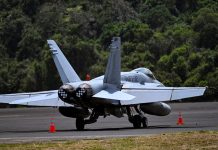The global consensus on the Israel-Hamas war is that there must be immediate “de-escalation” or ceasefire” of the conflict, now more than a week old, and that there should be resumption for negotiations towards a “two-state” solution.
Three important lessons seem to be emerging from this consensus.
First, few countries in the world are prepared to “condemn” Israel. The US, which is the principal source of moral and military support to the Jewish state, has stuck to its traditional position of Israel’s right of self-defense.
During his talks with Israeli Prime Minister Benjamin Netanyahu on the night of May 17, US President Joe Biden “condemned the rocket attacks by Hamas… [and] conveyed his unwavering support for Israel’s security and for Israel’s legitimate right to defend itself, while protecting civilians”.
Secondly, even the major Arab countries have joined the rest of the world in branding Hamas as a terrorist organization.
In fact, the clashes have revealed Hamas’ increasing isolation because of its terrorist methods. So much so that President of the State of Palestine and Palestinian National Authority Mahmoud Abbas (Abu Mazen), who is based in West Bank bordering Jerusalem (Hamas is operating from Palestinian territory in Gaza located in between Egypt and Israel) has disassociated himself from Hamas.
The latest Gaza toll: The fighting "has damaged 17 hospitals and clinics in Gaza, wrecked its only coronavirus test laboratory, sent fetid wastewater into its streets and broke water pipes serving at least 800,000 people." https://t.co/MYHCtZ0wdt pic.twitter.com/gAy2hAgj2Y
— Kenneth Roth (@KenRoth) May 19, 2021
In fact, Abbas has now used the clashes as a pretext to postpone the scheduled Palestine polls which Hamas was trying to fight and unseat him from the office. Abbas, 85, is in the 17th year of his four-year presidential term and is nominally presiding over a deeply divided polity.
Thirdly, despite the global consensus on a two-state formula for the permanent solution to the Israel-Palestine issue and increasing criticisms in recent years, including that of the US, of Israeli actions of legitimizing the Jewish settlements in the occupied territories (after the 1967 war) that should go to the state of Palestine, Iran’s open economic and military support to the Hamas and its rigidity in not recognizing the existence of Israel as a country seems to have worsened the crisis in the Middle East.
Use Of Iran-Made Drones
In fact, if the Israelis are to be believed, in the ongoing attacks on their southern territory, Hamas is using liberally Iran-made drones, referred to as “suicide” or “kamikaze” drones. Iran’s drones have brought something to the battlefield that was not there before.
It is said that Iran’s drone strategy has been to use them like cruise missiles. They are packed with explosives and having been put a gyroscope and guidance on them, they fly to a pre-planned target. They are not costly to make, but Israel has to defend itself against them by using the highly expensive Iron Domes.
The role of Iran in supporting Hamas and other extremist Palestine organizations like the Hezbollah, which, like Hamas’ so-called “holy war” against Israel, vilifies Jews as “the enemies of mankind” and assists the former in making bombs and missiles in Gaza, has now embarrassed the Biden administration’s attempts at rapprochement with Teheran.
“…We’ve been forced to move into the General Assembly (this coming Thursday, 20 May) because we’ve been forced to…” Amb. Mansour @Palestine_UN @UN @UN_PGA @antonioguterres #GazaUnderAttack #SaveSheikhJarrah #Palestine pic.twitter.com/D6qiMdsf2g
— State of Palestine (@Palestine_UN) May 18, 2021
On May 17, former Vice President Mike Pence wrote an op-ed, saying that whereas the Trump administration had ensured peace and stability in the Middle East by not only standing solidly behind Israel but also by brokering “the Abraham Accords”, resulting in a series of historic peace agreements between Israel and Arab-Muslim countries like the UAE, Bahrain, Morocco, and Sudan.
“President Biden has emboldened anti-Semitic terrorist groups such as Hamas by shunning Israeli leaders and restoring more than $200 million in aid to the Palestinians that had been canceled by the Trump-Pence administration.
He unilaterally took the Iranian-backed Houthis off the list of designated terrorist organizations. And worst of all, he has announced his intention to rejoin the Iran nuclear deal, destabilizing the entire region,” Pence wrote.
He added, “Every tepid statement uttered by the Biden-Harris administration is built on a false equivalency between Israel and Hamas. One is a sovereign nation with a legitimate government and a trusted ally.
The other is an internationally recognized terrorist organization that has fired more than 3,000 rockets at Jewish families and businesses in the past week. There is no moral equivalency between Israel and the terrorist group Hamas.
President Biden and every American leader should uphold Israel’s right to self-defense and condemn the terrorists of Hamas — as well as their supporters and apologists — in the strongest possible terms.”
Israel-Hamas Clash: OIC Takes Cautious Approach
The Iran factor also explains why notwithstanding their exchange of rhetoric at the Organisation of Islamic Cooperation (OIC) meet on May 16, the leading countries of the Middle East, have been quite restrained in their individual utterances on Israel this time.
Saudi Arabia, Bahrain, and the United Arab Emirates have only called for a ceasefire. None of their heads of the government has made any public statements so far.
It may be noted that though Saudi Arabia has not signed any “Abraham accord” with Israel so far, it has been quietly building its own relationship with Israel. Last year, Israeli Prime Minister Benjamin Netanyahu had made a historic visit to Saudi Arabia. This was a secret visit, though.
It is an open secret that Israel has long maintained semi-secret security contacts with Saudi Arabia, as it had with the United Arab Emirates and Bahrain.
It is not that the leading Middle East countries find common cause with Israel because of their commitment to Zionism; they need Israel’s cooperation in opposing Iranian and Sunni extremism. They want a politically stable and prosperous Middle-East, with a prominent role for the region’s traditional monarchies and nondemocratic regimes that increasingly view Palestinian nationalism as a threat to their core national interest.
These being the ground realities, what is the likely outcome of the present war?
India Takes A ‘Safe’ Stand
Martin Indyk, a former US Special Envoy for Israeli-Palestinian Negotiations, gives a hint. “We’ve seen Israel-Hamas wars before—the last one was in 2014—and we know how they go.
Hamas, with assistance from the Iranian-backed Palestinian Islamic Jihad, fires off its rockets indiscriminately. Israel retaliates disproportionately. The United States supports Israel’s right to defend itself. Europe wags its finger at Israel.
"In conclusion India reiterates it's strong support to the just Palestinian cause and it's unwavering commitment to the two-state solution" #IndiaStandsWithPalestine ??pic.twitter.com/LQQOWdnwfo
— Mohammed Zubair (@zoo_bear) May 16, 2021
“Hamas eventually decides it has made its point. Qatar and Egypt mediate a cease-fire based on the usual ‘quiet for quiet’ deal. Both sides bury their dead, clear the rubble, and go back to business as usual while the Israel Defense Forces (IDF) and Hamas’s Ezzedeen al-Qassam Brigades prepare for the next round”, he points out.
Against this background, it is understandable why India has taken a “safe” stand on the issue. In the United Security Council meeting on May 17, India called for an immediate de-escalation of the situation between Israel and Palestine
“The indiscriminate rocket firings from Gaza targeting the civilian population in Israel, which we condemn, and the retaliatory strikes into Gaza, have caused immense suffering and resulted in deaths,” T S Tirumurti, India’s Permanent Representative to the world body, said, adding that India had lost one of its citizens, a caregiver in Ashkelon (30-year-old Soumya Santosh from Kerala).
Israel is not only India’s third-largest trading partner in Asia but also among its top four arms suppliers, notching military sales worth around $1 billion every year. As in Kargil War in 1999, in the recent standoff with China in Ladakh, India was helped by Israeli missiles, sensors, cyber-security, and various defense subsystems.




